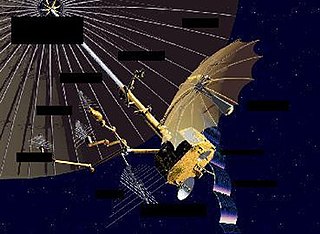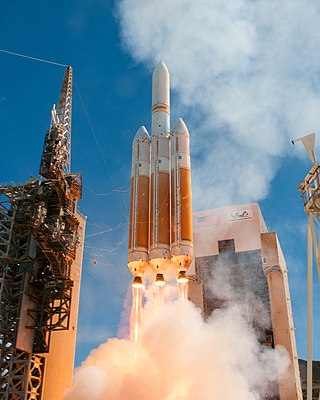The final half-decade of launches in the Thor/Delta family consisted of one Delta IV Heavy each year from 2020 through 2024. This followed the retirement of Delta II in 2018 and single-stick (non-Heavy) variants of the Delta IV in 2019. With the start of 2024, Vulcan Centaur took its first flight in time to maintain continuity of ULA's service in the heavy-lift launch vehicle market before the Delta IV Heavy program came to an end three months later on April 9, 2024.
| List of Thor and Delta launches |
|---|
| 1957–1959 · 1960–1969 · 1970–1979 · 1980–1989 · 1990–1999 · 2000–2009 · 2010–2019 · 2020–2024 |
2020 | ||||||||
| Flight No. | Date / time (UTC) | Rocket, Configuration | Launch site | Payload | Payload mass | Orbit | Customer | Launch outcome |
|---|---|---|---|---|---|---|---|---|
| 385 | 11 December 2020 01:09 | Delta IV Heavy | CCSFS, SLC-37B | USA-311 (NROL-44) | Classified | GSO | US NRO | Success [1] |
| Reconnaissance satellite, likely an Orion satellite. [2] Launch attempts on 29 August and 30 September were aborted due to problems with the Ground Service Equipment (GSE). [3] [4] The rocket finally lifted off on 11 December. | ||||||||
2021 | ||||||||
| Flight No. | Date / time (UTC) | Rocket, Configuration | Launch site | Payload | Payload mass | Orbit | Customer | Launch outcome |
| 386 | 26 April 2021 20:47 | Delta IV Heavy | VAFB, SLC-6 | USA-314 (NROL-82) | Classified | LEO | US NRO | Success [5] |
| Reconnaissance satellite, likely a KH-11 Kennen satellite. [2] | ||||||||
2022 | ||||||||
| Flight No. | Date / time (UTC) | Rocket, Configuration | Launch site | Payload | Payload mass | Orbit | Customer | Launch outcome |
| 387 | 24 September 2022 22:25:30 | Delta IV Heavy | VAFB, SLC-6 | NROL-91 | Classified | LEO | US NRO | Success [6] |
| Reconnaissance satellite, likely a KH-11 Kennen satellite. [2] Final Delta flight from Vandenberg. | ||||||||
2023 | ||||||||
| Flight No. | Date / time (UTC) | Rocket, Configuration | Launch site | Payload | Payload mass | Orbit | Customer | Launch outcome |
| 388 | 22 June 2023 09:18 | Delta IV Heavy | CCSFS, SLC-37B | NROL-68 | Classified | GEO | US NRO | Success [7] |
| Reconnaissance satellite, likely an Orion satellite. [2] | ||||||||
2024 | ||||||||
| Flight No. | Date / time (UTC) | Rocket, Configuration | Launch site | Payload | Payload mass | Orbit | Customer | Launch outcome |
| 389 | 9 April 2024 16:53 [8] | Delta IV Heavy | CCSFS, SLC-37B | NROL-70 | Classified | GEO | US NRO | Success |
| Reconnaissance satellite, likely an Orion satellite. [2] Final flight of the Delta rocket family. | ||||||||

Delta IV was a group of five expendable launch systems in the Delta rocket family. It flew 45 missions from 2002 to 2024. Originally designed by Boeing's Defense, Space and Security division for the Evolved Expendable Launch Vehicle (EELV) program, the Delta IV became a United Launch Alliance (ULA) product in 2006. The Delta IV was primarily a launch vehicle for United States Air Force (USAF) military payloads, but was also used to launch a number of United States government non-military payloads and a single commercial satellite.

National Security Space Launch (NSSL) is a program of the United States Space Force (USSF) intended to assure access to space for United States Department of Defense and other United States government payloads. The program is managed by the Assured Access to Space Directorate (SSC/AA) of the Space Force's Space Systems Command (SSC), in partnership with the National Reconnaissance Office.

Atlas V is an expendable launch system and the fifth major version in the Atlas launch vehicle family. It was designed by Lockheed Martin and has been operated by United Launch Alliance (ULA) since 2006. It is used for DoD, NASA, and commercial payloads. It is America's longest-serving active rocket. After 87 launches, in August 2021 ULA announced that Atlas V would be retired, and all 29 remaining launches had been sold. As of July 2024, 15 launches remain. Production ceased in 2024. Other future ULA launches will use the Vulcan Centaur rocket.

The Graphite-Epoxy Motor (GEM) is a family of solid rocket boosters developed in the late 1980s and used since 1990. GEM motors are manufactured with carbon-fibre-reinforced polymer casings and a fuel consisting of HTPB-bound ammonium perchlorate composite propellant. GEM is produced by Northrop Grumman Space Systems. GEM boosters are used on the Atlas V and were previously used on the Delta II, Delta III, and Delta IV launch vehicles. A new variant, the GEM 63XL, flew as part of the Vulcan Centaur launch vehicle on 8 January 2024.

Falcon 9 is a partially reusable, human-rated, two-stage-to-orbit, medium-lift launch vehicle designed and manufactured in the United States by SpaceX. The first Falcon 9 launch was on 4 June 2010. The first Falcon 9 commercial resupply mission to the International Space Station (ISS) launched on 8 October 2012. In 2020 it became the first commercial rocket to launch humans to orbit. In 2022, it became the U.S. rocket with the most launches in history and with a near perfect safety record, having suffered two flight failures.

The Minotaur is a family of United States solid fuel launch vehicles derived from converted Minuteman and Peacekeeper intercontinental ballistic missiles (ICBM). They are built by Northrop Grumman via contract with the Space Force's Space Systems Command as part of the Space Force's Rocket Systems Launch Program (RSLP) which converts retired Intercontinental Ballistic Missiles into space and test launch systems for U.S. government agencies.

Vandenberg Space Launch Complex 6 is a launch pad and associated support infrastructure at Vandenberg Space Force Base in California. Construction at the site began in 1966, but the first launch didn't occur until 1995 due to program cancellations and subsequent repurposing efforts.

United Launch Alliance, LLC (ULA) is an American launch service provider formed in December 2006 as a joint venture between Lockheed Martin Space and Boeing Defense, Space & Security. The company designs, assembles, sells and launches rockets, but the company subcontracts out the production of rocket engines and solid rocket boosters.

Orion, also known as Mentor or Advanced Orion, is a class of United States spy satellites that collect signals intelligence (SIGINT) from space. Operated by the National Reconnaissance Office (NRO) and developed with input from the Central Intelligence Agency (CIA), eight have been launched from Cape Canaveral on Titan IV and Delta IV launch vehicles since 1995.

The Delta IV Heavy was an expendable heavy-lift launch vehicle, the largest type of the Delta IV family. It was the world's third highest-capacity launch vehicle in operation at the time of its retirement in 2024, behind NASA's Space Launch System and SpaceX's Falcon Heavy and closely followed by CASC's Long March 5. It was manufactured by United Launch Alliance (ULA) and was first launched in 2004. ULA retired the Delta IV Heavy in 2024. Future ULA launches will use the new Vulcan Centaur rocket. Delta IV's final flight was on 9 April 2024.

This article documents notable spaceflight events during the year 2019.

USA-245 or NRO Launch 65 (NROL-65) is an American reconnaissance satellite which is operated by the National Reconnaissance Office. Launched in August 2013, it is the last Block 4 KH-11 reconnaissance satellite, and the last official spacecraft to be launched in the Keyhole program.

Vulcan Centaur is a heavy-lift launch vehicle created and operated by United Launch Alliance (ULA). It is a two-stage-to-orbit launch vehicle consisting of the Vulcan first stage and the Centaur second stage. It replaces ULA's Atlas V and Delta IV rockets. It is principally designed for the National Security Space Launch (NSSL) program, which launches satellites for U.S. intelligence agencies and the Defense Department, but will also be used for commercial launches.